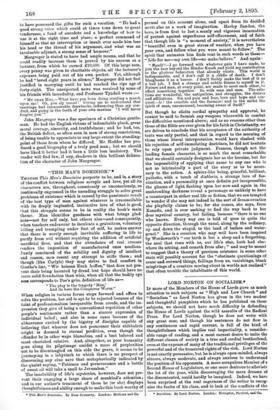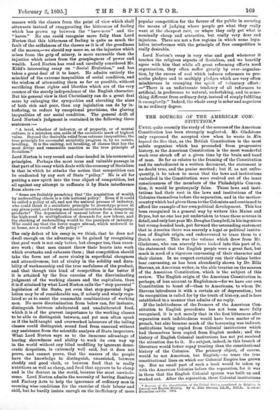LORD NORTON ON SOCIALISM.* IF more of the Members of
the House of Lords gave as much attention to such subjects as "High and Low Church" and " Socialism " as Lord Norton has given in the two modest and thoughtful pamphlets which he has published on these subjects, we should not have much difficulty in defending the House of Lords against the wild assaults of the Radical Press. For Lord Norton, though he does not write with any great ease, and though his sentences do not flow in any continuous and rapid current, is full of the kind of thoughtfulness which implies real impartiality, a consider- able range of reading, and a most earnest desire to unite the different classes of society in a true and cordial brotherhood, even at the expense of many of the traditional privileges of the powerful and of the treasured rights of the rich. Lord Norton is not exactly persuasive, but he is always open-minded, always sincere, always moderate, and always anxious to understand the position of his opponents. A more scrupulous Member of a Second House of Legislature, or one more desirous to alleviate the lot of the poor, while discouraging the mere dreams of the discontented, could hardly be imagined. Indeed, we have been surprised at the real eagerness of the writer to recog- nise the faults of his class, and to look at the conflicts of the
• Socialism, By Lord Norton. London: Rivington, Percival, and Co.
masses with the classes from the point of view which shall attenuate instead of exaggerating the bitterness of feeling which has grown up between the " have-nots " and the
"haves." No one could recognise more fully than Lord Norton that this bitterness of feeling is quite as much the fault of the selfishness of the classes as it is of the greediness of the masses,—we should say more so, as the injustice which
arises from the grip of misery, is more excusable than the injustice which arises from the graspingness of power and wealth. Lord Norton has read and carefully considered Mr. Kidd's interesting essay on " Social Evolution," and has taken a great deal of it to heart. He admits entirely the mischief of the extreme inequalities of social condition, and the wisdom of attenuating them so far as possible, without sacrificing those rights and liberties which are of the very essence of the sturdy independence of the English character.
But his general view is that Christianity can do a great deal more by enlarging the sympathies and elevating the aims of both rich and poor, than any legislation can do by in- terfering, to reduce by exceptional provisions, the glaring inequalities of our social condition. The general drift of Lord Norton's judgment is contained in the following three sentences :—
"A level, whether of industry, or of property, or of mental culture, is a mistaken aim, aside of the socialistic mark of highest value. Beyond the desirable relief from extreme inequalities, the true principle for successful socialistic progress is, by no means, levelling. It is the uniting, not levelling, of classes that has the most divine and reasonable sanction as the true principle of Socialism."
Lord Norton is very sound and clear-headed in his economical principles. Perhaps the most terse and valuable passage in that part of his essay which deals with the economy of Socialism is that in which he attacks the notion that competition can be eradicated by any sort of State "policy." He is all for putting a new spirit into the true object of competition, but all against any attempt to suffocate it by State interference from above :-
"Some are foolishly preaching that the acquisition of wealth by underselling others is a vile national policy.' Even if it could be called a policy at all, and not the natural process of industry, who could think it a socialistic principle to stereotype prices at any given point, and to stop mechanical invention from cheapening products ? The depreciation of manual labour for a time is on the high-road to multiplication of demands for new labour, and the checking of underselling would be the paralysis of industry. Who could say that the lower wages abroad, which undersell us at home, are a result of vile policy ? "
The only defect of his essay is, we think, that he does not dwell enough on the advantage to be gained by recognising that good work is not only better, but cheaper too, than exces-
sive work ; that men cannot throw their hearts into work which overtasks and exhausts them ; that competition should take the form not of mere rivalry in superficial cheapness and attractiveness, but of rivalry in the solidity and dura- bility of workmanship and the true usefulness of the product, and that though this kind of competition is far better if it is attained by the free exercise of the discriminating judgment of the working classes and the capitalists, than it is if attained by what Lord Norton calls the " step-parental" legislation of the State, yet even that step-parental legis- lation may be of considerable use, if soberly and wisely regu- lated so as to assist the reasonable combinations of working men. No mere discrimination from below can, for instance, distinguish between adulterated and unadulterated food, which it is of the gravest importance to the working classes to be able to distinguish between, and yet men often speak as if the half-taught and overworked labourers of the toiling classes could distinguish sound food from unsound without any assistance from the scientific analysis of State inspectors. What Lord Norton says as to the immense advantage of leaving shrewdness and ability to work its own way up in the world without any blind meddling by ignorant demo- cratic despotism, is extremely well said, but it does not prove, and cannot prove, that the masses of the people have the knowledge to distinguish, unassisted, between shoddy and good cloth, or between food that is really nutritious as well as cheap, and food that appears to be cheap and is the dearest in the world, because the most unwhole- some. Lord Norton admits the necessity of having Sanitary and Factory Acts to help the ignorance of ordinary men in securing wise conditions for the exercise of their labour and skill, but he hardly insists enough on the inefficiency of mere
popular competition for the favour of the public in securing the means of judging where people get what they really want at the cheapest rate, or where they only get what is nominally cheap and attractive, but really very dear and injurious. There are not a few regions in which some legis- lative interference with the principle of free competition is really desirable.
Lord Norton's essay is very wise and good whenever it touches the religions aspects of Socialism, and we heartily agree with him that while all great reforming efforts need organisation, they often suffer greatly by over - organisa- tion, by the excess of zeal which induces reformers to pre- scribe pledges and to multiply pledges which are very often mischievous in cramping the spirit of voluntary effort : —"There is an unfortunate tendency of all reformers to artificial, in preference to natural, undertaking, and to some- thing different from ordinary duty, instead of simply fulfilling it exemplarily." Indeed, the whole essay is sober and sagacious in no ordinary degree.



































 Previous page
Previous page